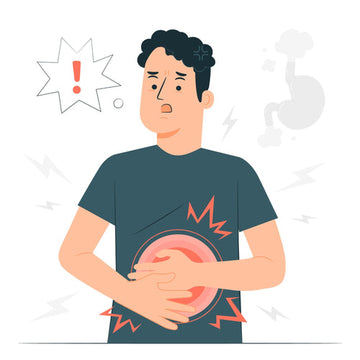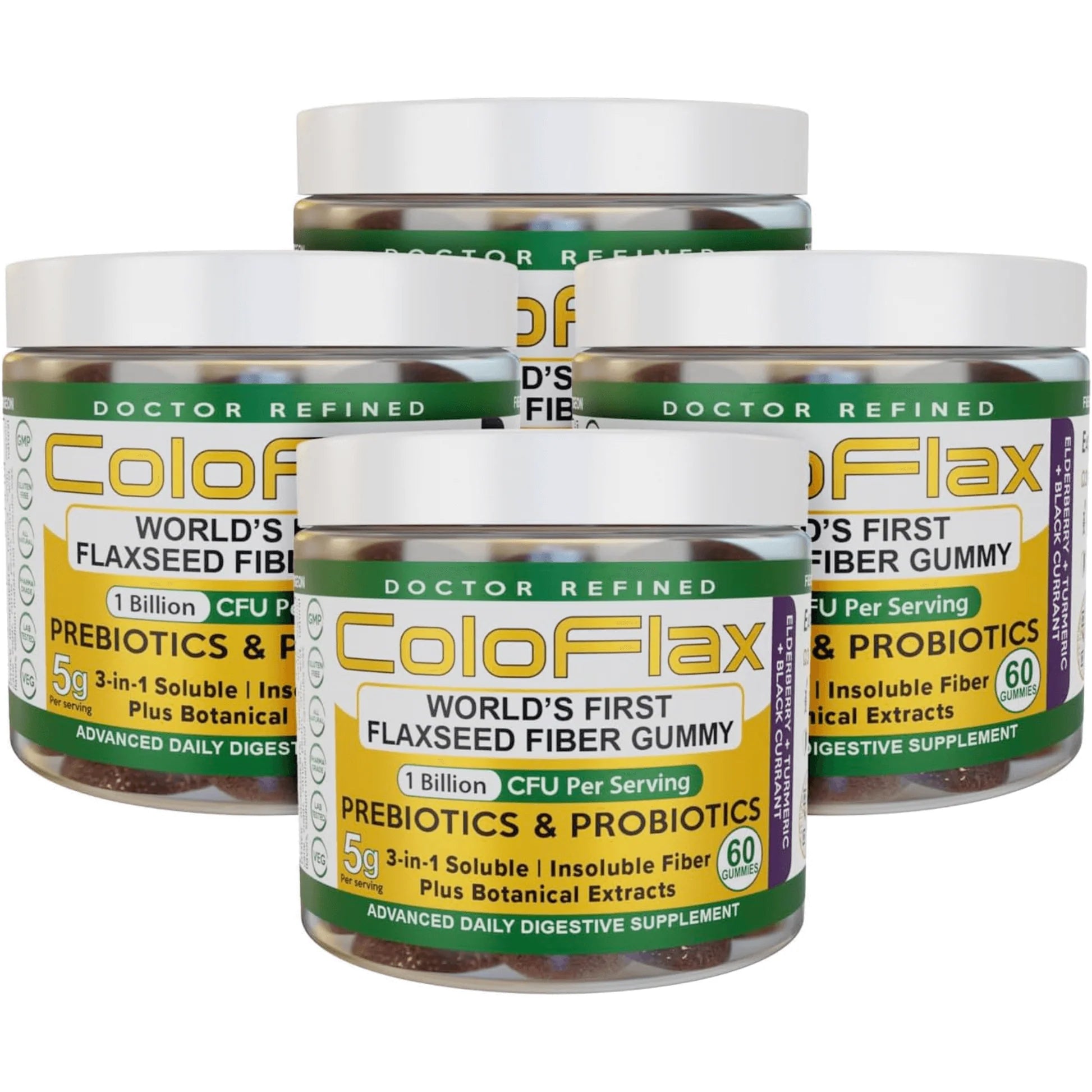If you’re constipated, gassy, or struggling with bouts of diarrhea, it can ruin your day. If it persists, you could have a tired, frustrating, and irritable week ahead of you. With this in mind, it’s no wonder that the digestive health market is worth tens of billions of dollars.(1)
But with so many supplements to choose from, how do you know which ones work? In the following guide, we’ll take a look at the best options.
Flaxseed Fiber
You don’t see a lot of flaxseed fiber supplements. They are incredibly effective. In many ways, they are the perfect package, as flaxseeds are high in fiber, antioxidants, nutrients, and omega-3 fatty acids.
Flax also contains something known as phytoestrogens (lignans). It is by far the best source of these compounds, which is why it’s important to ensure your flaxseed has a high lignan content.
Lignans may support your digestive and overall health in a variety of ways, and there is a wealth of studies out there supporting these benefits.(2)
But if flaxseeds are so beneficial, why aren’t they in every fiber and digestive supplement?
The problem is that flaxseed is not as cheap as some other popular ingredients, it’s not easy to fit an effective dose into a convenient pill, and they have a distinctive taste that can make powder mixes and gummies difficult.
That’s why we took so long to develop ColoFlax. We wanted to unlock the power of flaxseeds and create the ultimate digestive supplement, but we also wanted it to be 100% natural, convenient, and tasty, and that took time.
If you want a simple one-serving-a-day flaxseed gummy, ColoFlax is the only way to go. We were the first flaxseed fiber gummy and at the time of writing, we’re still the only one.
If you’re looking for an alternative, pick up a bag of powdered flaxseed. You can add a scoop to smoothies, protein shakes, cereals, and more. It’s messier, not as convenient, and it lacks the additional extracts and fiber that elevate ColoFlax into an industry-leading supplement, but it’s a cheap and accessible way to consume flaxseed.
Probiotics
In addition to fiber, ColoFlax is high in probiotics. The same is true for most of the best gut health supplements, as probiotics have many proven benefits, including in relation to digestive complaints and heart health.(3)(4)(5)
If you eat a diet high in processed food, drink a lot of alcohol, or have recently taken a course of antibiotics, your gut may lack the beneficial bacteria it needs to thrive. Probiotics introduce healthy bacteria to your gut, topping up the existing bacteria and restoring the balance.
Prebiotics are equally important. A prebiotic is essentially a high-fiber food on which the healthy bacteria feed. It keeps them strong, allows them to flourish, and thus ensures they are capable of fighting pathogens and keeping your gut strong and healthy.
Supplements are the easiest way to take probiotics, but you shouldn’t rely on supplementation. Increase your consumption of natural probiotics by adding more fermented foods to your diet. Natural yogurt is one of the best sources of these healthy gut bacteria, but those following a vegan or lactose-free diet can get their fill from sauerkraut, tempeh, miso, kimchi, pickles, and kombucha.
Fermented foods are usually low-calorie, low fat, and rich in many other nutrients, so it doesn’t hurt to add them to your diet. However, you’ll need to be careful with highly acidic foods if you have stomach or digestive issues like GERD.
Psyllium Husk
Psyllium husk is not the most pleasant gut health supplement, and it lacks the holistic approach accorded by flaxseed. But it’s incredibly effective at treating constipation and restoring regularity, and it’s also very cheap.
Psyllium husk, also known as Ispaghula husk, is derived from the seeds of the Plantago ovata plant. It is a soluble fiber that works by absorbing water and creating a gel-like blob that moves slowly through the gut, creating volume and helping to shift slow-moving stools.
There are a few very important caveats though.
Firstly, for psyllium husk to work, you must drink lots of water. If not, it could worsen the issue as that “gel-like blob” will dry out. There are numerous recorded cases of people taking psyllium, not drinking enough water, and then reporting a worsening of their symptoms and eventual intestinal obstruction.(6)
Secondly, it’s very important to read the label and avoid exceeding the stated dose. Again, this could lead to an intestinal blockage. At the very least, it will cause abdominal discomfort and pain resulting from a large mass of fiber moving through the digestive tract.
Finally, while some doctors recommend taking psyllium husk with certain laxatives, you should be very cautious when mixing it with other drugs and supplements. Speak with your doctor first and always read the label.
Turmeric
You could be forgiven for dismissing turmeric as a “flavor of the month” supplement, one of those “miracle superfoods” that comes from nowhere, gets a lot of publicity, and then disappears back into obscurity. But the turmeric fad isn’t going anywhere, and that’s because it actually works and its benefits are supported by endless scientific data and clinical trials.
The benefits of this common spice come from its main active ingredient, curcumin. It has been studied for its effects in supporting heart and digestive health, and could serve a variety of other purposes.
For maximum benefits, consume turmeric with a little black pepper and/or fat, as that will increase its bioavailability and ensure you get more of the beneficial compounds.
You can buy whole turmeric roots and grind/grate/chop them into smoothies, coffees, teas, and food; buy turmeric powder to add to meals and drinks, or take turmeric supplements. All are beneficial.
It’s often best to stick with whole foods where you can, and both turmeric root and turmeric powder are very cheap, widely available, and easy to use. But many of the clinical trials involving turmeric used high-curcumin extracts, so supplements are an ideal alternative if you want something easy and convenient that won’t turn your fingers yellow.
Inulin
Inulin is a prebiotic fiber found in a wide range of fruits and vegetables, including chicory root, leeks, artichokes, onions, and soybeans. It’s commonly used in digestive supplements, with many producers sourcing their inulin from chicory root.
You’ll also find this fiber in many sweet treats and baked goods that combine added fiber.
A regular dose of inulin could help to restore digestive regularity by increasing your daily consumption of soluble fiber. As with psyllium, it creates a bulk in the gut and this moves through slowly, drawing more water, expanding, and eventually passing through.
Always follow the guidelines on the label and drink plenty of water.
How to Find the Best Digestive Health Supplements
The ingredients above are just a few of the effective ways to improve your digestive health. But there are more. There are also many supplements that contain a blend of the above in addition to other ingredients.
So, what should you be looking for the next time you browse the shelves of your local supplement store in search of a digestive remedy?
Be Wary of Grandiose Claims
If it sounds too good to be true, it probably is. Nowhere is that more true than in the supplement industry.
Some manufacturers and marketers want you to believe that we’re living in some kind of futuristic utopian society whereby a single pill can cure you of all that ails you. That’s simply not the case, and while proper digestive health can have a massive impact on everything from your cardiovascular health to your emotional health and cognitive function, you can’t get there with a single tablet.
By the same token, look out for anything that brands itself as a “detox” supplement. Thankfully, the era of the faux detox seems to be behind us, but some companies still push the agenda.
Your body can accumulate toxins, that much is true, and it’s important to get rid of them. But that’s what your liver is for, and you can’t replace the job of a major organ with a supplement.
Check for Laxatives
One of the issues with detox supplements is that they were essentially just laxatives with fancy labeling and a few obscure extracts that made you think you were getting a magical elixir. If your digestive health is suffering as a result of chronic constipation, taking laxatives will clear you out and make you feel great. That’s why these supplements were so effective, albeit only in the short term.
But long-term laxative use can have a seriously detrimental effect on your health and should be avoided.
Always check the label of your chosen digestive supplement to make sure it’s not just a laxative in disguise. Look for ingredients like sennosides and aloe vera—they’re natural, but they also have a strong laxative effect.
Stick with Reputable Companies
The supplement sector isn’t as well regulated as you might think. The best companies go out of their way to source high-quality ingredients, test every batch, and ensure they know exactly what’s going into their product. This devotion to purity and transparency is something we take very seriously at ColoBotanix.
Unfortunately, however, the same can’t be said for all companies in the supplement sector and many products aren’t as clean and pure as they claim. Some of them don’t contain the same potency of extract mentioned on the label while others don’t even include the same ingredients!
That’s why it’s important to stick with legitimate and reputable companies. Avoid suspicious companies that can’t back up their claims, don’t have any real people behind their brands, and have little to no information on their product labels.
We’re not saying that you should stick with big-name brands that you’ve seen advertised on TV. Small brands and family-run companies can be just as reputable, and in many cases, they are even more devoted to their customers. Just make sure you do a little research on the brands before you buy.
Summary: Finding the Best Supplements for Digestive Health
Digestive supplements are a great way to support your digestive health and can be especially useful if you’re struggling with repeat bouts of constipation, diarrhea, or flatulence. Just remember to read the label and follow the guidelines, and don’t forget to make changes to your diet and lifestyle as well.
Drink more water, eat plenty of fiber, and stay active—exercise is great for getting things moving down there. If your problems persist or are accompanied by extreme abdominal pain or bloody stools, speak with your healthcare provider.
References
- https://www.globenewswire.com/en/news-release/2023/02/23/2614033/0/en/Digestive-Health-Market-Size-104-4-Bn-by-2032-at-8-2-CAGR-Globally-Analysis-by-Market-us.html
- https://www.ncbi.nlm.nih.gov/pmc/articles/PMC4375225/
- https://pubmed.ncbi.nlm.nih.gov/31039287/
- https://pubmed.ncbi.nlm.nih.gov/30586435/
- https://pubmed.ncbi.nlm.nih.gov/30014799/
- https://www.ncbi.nlm.nih.gov/pmc/articles/PMC6197948/






